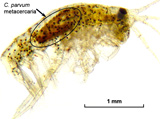séminaire du pôle évolution du vivant – vendredi 27 novembre 2009
Alternative life history strategies in parasites: effects of environmental factors and intra-host competition
Clément Lagrue, Department of Zoology, University of Otago, New Zealand
vendredi 27 novembre 2009, à 11 heures, bâtiment Gabriel
Parasites with complex life-cycles have developed numerous adaptations to enhance their transmission rate. One of these is the ability of some species to drop one or more hosts from their cycle. This usually optional truncation of the life-cycle occurs when a larval stage matures precociously inside an intermediate host, a phenomenon known as progenesis. The optional adoption of progenesis by these parasites suggests that their environmental perception is more sophisticated than previously imagined, allowing parasites to respond adaptively to external stimuli. The trematode parasite Coitocaecum parvum can accelerate its development, while still inside its amphipod intermediate host, adopt progenesis and complete its life cycle even in the absence of its fish definitive host. In this study, we tested the ability of C. parvum to evaluate the presence and suitability of different predators as definitive hosts and adjust its strategy accordingly. Controlled infections of amphipods by C. parvum were used to test the precision of state-dependent decisions (progenesis versus normal cycle) made in reaction to chemical cues from the definitive host (common bully) and other natural predators that are unsuitable definitive hosts. The results indicate that the trematode can, to some extent, accurately adjust its life history strategy in response to the identity of the predators in the environment. Intra and/or interspecific competition among parasites sharing the same host are also major factors influencing individual parasite fitness. Because parasitic organisms rely on the limited space and nutrients available in their hosts, they also compete with co-infecting parasites for the same resources. Furthermore, different parasite species can have different definitive hosts and therefore compete for definitive host access. Parasites capable of progenesis and life cycle abbreviation may be able to detect the presence, species, abundance, and even genetic relatedness of other parasite individuals and appropriately adopt a particular strategy. Up to ten C. parvum individuals can be found in an infected amphipod and C. parvum is also known to share its intermediate host with two other parasite species; Acanthocephalus galaxii, infecting fish and a bird parasite, Microphallus sp. Here we tested whether individual C. parvum adjust their strategy to the presence, species and number of competitors in the second intermediate host. We found that both intra and interspecific competition influence the adoption of progenesis in C. parvum in variable ways depending on the type and number of competitors. Overall, this study shows that both the classical three-host cycle and abbreviated life cycle may be maintained overtime in Coitocaecum parvum populations due to the highly variable environment. Depending on the conditions, either cycle may be alternatively advantageous over the other, thus maintaining a fluctuating equilibrium between both strategies.
- kc_data:
- a:8:{i:0;s:0:"";s:4:"mode";s:0:"";s:3:"css";s:0:"";s:9:"max_width";s:0:"";s:7:"classes";s:0:"";s:9:"thumbnail";s:0:"";s:9:"collapsed";s:0:"";s:9:"optimized";s:0:"";}
- kc_raw_content:
Alternative life history strategies in parasites: effects of environmental factors and intra-host competition
Clément Lagrue, Department of Zoology, University of Otago, New Zealand
vendredi 27 novembre 2009, à 11 heures, bâtiment Gabriel

Parasites with complex life-cycles have developed numerous adaptations to enhance their transmission rate. One of these is the ability of some species to drop one or more hosts from their cycle. This usually optional truncation of the life-cycle occurs when a larval stage matures precociously inside an intermediate host, a phenomenon known as progenesis. The optional adoption of progenesis by these parasites suggests that their environmental perception is more sophisticated than previously imagined, allowing parasites to respond adaptively to external stimuli. The trematode parasite Coitocaecum parvum can accelerate its development, while still inside its amphipod intermediate host, adopt progenesis and complete its life cycle even in the absence of its fish definitive host. In this study, we tested the ability of C. parvum to evaluate the presence and suitability of different predators as definitive hosts and adjust its strategy accordingly. Controlled infections of amphipods by C. parvum were used to test the precision of state-dependent decisions (progenesis versus normal cycle) made in reaction to chemical cues from the definitive host (common bully) and other natural predators that are unsuitable definitive hosts. The results indicate that the trematode can, to some extent, accurately adjust its life history strategy in response to the identity of the predators in the environment. Intra and/or interspecific competition among parasites sharing the same host are also major factors influencing individual parasite fitness. Because parasitic organisms rely on the limited space and nutrients available in their hosts, they also compete with co-infecting parasites for the same resources. Furthermore, different parasite species can have different definitive hosts and therefore compete for definitive host access. Parasites capable of progenesis and life cycle abbreviation may be able to detect the presence, species, abundance, and even genetic relatedness of other parasite individuals and appropriately adopt a particular strategy. Up to ten C. parvum individuals can be found in an infected amphipod and C. parvum is also known to share its intermediate host with two other parasite species; Acanthocephalus galaxii, infecting fish and a bird parasite, Microphallus sp. Here we tested whether individual C. parvum adjust their strategy to the presence, species and number of competitors in the second intermediate host. We found that both intra and interspecific competition influence the adoption of progenesis in C. parvum in variable ways depending on the type and number of competitors. Overall, this study shows that both the classical three-host cycle and abbreviated life cycle may be maintained overtime in Coitocaecum parvum populations due to the highly variable environment. Depending on the conditions, either cycle may be alternatively advantageous over the other, thus maintaining a fluctuating equilibrium between both strategies.
- extrait:
- lien_externe:
- titre:
- Alternative life history strategies in parasites: effects of environmental factors and intra-host competition
- intervenant:
- Clément Lagrue
- date:
- vendredi 27 novembre 2009
